Indian cities face a grim reality. Our winters have become unbearable and summers more parched. Some parts of the country either get excessive rainfall while some too little.
In the winter, northern India observes a meteorological phenomenon called temperature inversion. This means warm air rises above the cold air, trapping air pollution near the ground. Pollutants like NOx, Sulphur Dioxide, and other harmful chemicals lead to a sterile ecosystem. Automobiles and industries are the reason for the increased emission of black carbon. And high ozone levels with harmful gases contribute to poor air quality.
The dense presence of particulate matter (PM 2.5) in the environment impacts human health. Fine particles can enter the bloodstream and respiratory system. And over time, they deposit on the lungs, which increases the risks of respiratory diseases and lung cancer. Air pollution can have various adverse health problems, such as:
1. It aggravates respiratory infection and other illnesses
Our nose and the respiratory tract are the gateways to all the toxic air we breathe. Cold, cough and influenza-like symptoms have become common due to pollution. People who have asthma and recurrent respiratory illnesses suffer more than others.
The World Health Organization states the grave dangers of air pollution and how it causes several respiratory infections. As it is the reason for about 7 million yearly premature deaths worldwide. The increased mortality rate observed is due to disorders such as:
-
- Stroke
- Cardiovascular diseases
- Chronic obstructive pulmonary disease (COBD)
- Lung cancer and
- Acute respiratory infections
Each of the ailments holds some degree of impact from air pollution.
2. It can cause skin damage
Skin is the most exposed organ of our body. And harsh environmental conditions and air pollution can have an adverse effects. Small particles in the pollutant clog the pores on the skin. This leads to rashes, irritation, acne, and other skin allergies. Recent studies show that air pollution causes severe skin allergies—eczema and psoriasis, to name a few. And a long-standing exposure to polluted air can cause skin cancer. Air pollution can also speed up the process of aging the skin.
3. It reduces resistance to infections
Research shows that continued exposure to polluted air disrupts the growth of T-cells. T-cells are an integral part of our immune system, which is necessary to eradicate the antigens that invade our bodies. Long-term exposure to fine particulate matter can be detrimental to the immune system. And make you prone to infections. In the time of Covid-19, this can prove fatal, as our body relies on the T-cells to fight any infection.
Saying that air pollution is deadly wouldn’t be an exaggeration. And no matter what, most people can’t leave the city and live in rural India or coastal towns for better air quality. But, the good news is that there are specific measures to reduce the effects of air pollution.
You can implement certain lifestyle changes to deal with air pollution. Some of them are listed below:
Never leave home without an anti-pollution mask
N95 masks are expensive, but for a good reason. It has scientific proof to block out PM 2.5, apart from PM 10. However, your breath might feel constricted as the masks can be close-fitting. The weave pattern is compact to avoid any seepage through it. You can become habituated to breathing through the mask as it is permeable. And consider wearing them everywhere for good measures. N95 masks aren’t washable like other masks, so ensure you replace them after every fifth or sixth use.
Avoid exercise in the morning
The amount of environmental pollutants is usually at its highest in the mornings. Thus, it is not advisable to engage in high-intensity training outdoors. Moreover, avoiding high-level ozone and ultraviolet rays in the sunlight is better. People with respiratory issues or lung diseases should take care of themselves. It would be best not to run or walk outside for an extended period in the early mornings. Instead, you might try breathing exercises at home as indoor air pollution tends to be lower than outside. Or better still, exercising in an air-purified space is the best option for your well-being.
Create your clean air bubble at home
Air filters and indoor plants can help you breathe better and improve your lung capacity. A high-efficiency particulate air filter can clear the air around you. You can even choose an air conditioner with purifying functions.
Certain indoor plants can even supply fresh oxygen during the night. Growing a plant might seem like a difficult task. But, you can find some good options among low-maintenance indoor plants. Plants are the most affordable option considering the gradual increase in air pollution. Indian environmentalist Kamal Meattle did a joint study with IIT Delhi. The research was to study the impact of indoor plants on air quality. According to the research, Areca palm, Snake plant, and Money plant can help you grow fresh air inside your house. These plants do not need a lot of care. But it would help if you read and research the plants you bring home. Some plants are unsafe for babies and pets, so remember to choose them cautiously.
You can even consider creating a bio wall for your space. A bio-wall is an air filtering system designed as a vertical garden. It functions by running the ventilated air from an entire building through the plants. The toxic air goes through the root area of the plants. Then the microbes in the roots break down the pollutants and provide pure air for an entire building. Besides that, a small kitchen garden can also prove to be therapeutic. It also contributes to your home’s aesthetic. Remember to seal your windows and doors to keep the polluted air out.
Installation of a bio-wall can also help produce clean air for larger buildings. A bio-wall can be connected to the ventilation system nd that can purify your entire apartment building or your entire office. Besides, gardening can also prove to be therapeutic and can be done by anybody at home. It also contributes to your home’s aesthetic. Indoor gardening improves the oxygen flow of the house and this can relax your mind and increase your productivity. Remember to seal your windows and doors so that the polluted air stays out.
To sum it up:
To combat the harmful effects of air pollution, we need to have changes on a systemic level. But until then, we should get as much help as possible at an individual level. Let’s continue to make nature our best friend and create our green bubble at home.
Plants are inexpensive and occupy less space and give us the best gift – that of clean air. The ongoing pandemic has made us reflect on our health and immune system. And has revealed the problems of an unhealthy lifestyle. Air pollution only worsens this crisis. So let’s take the matter into our own hands and give ourselves the gift of a beautiful indoor garden.


